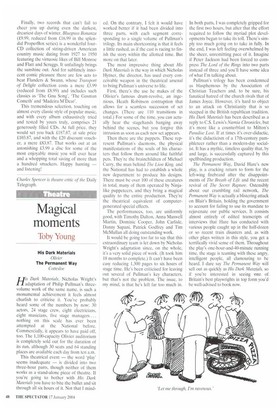Magical moments
Toby Young
His Dark Materials Olivier The Permanent Way Cottesloe
Llis Dark Materials, Nicholas Wright's / adaptation of Philip Pullman's threevolume work of the same name, is such a monumental achievement it feels almost churlish to criticise it. You've probably heard some of the numbers by now: 30 actors, 24 stage crew, eight electricians, eight musicians, five stage managers . . . nothing on this scale has ever been attempted at the National before. Commercially, it appears to have paid off. too. The 1,100-capacity Olivier auditorium is completely sold out for the duration of its run, although 30 seats and 64 standing places are available each day from ten a.m.
This theatrical event — the word 'play' seems inadequate — is divided into two three-hour parts, though neither of them works as a stand-alone piece of theatre. If you're going to bother with His Dark Materials you have to bite the bullet and sit through all six hours of it. Not that I mind
ed. On the contrary, I felt it would have worked better if it had been divided into three parts, with each segment corresponding to a single volume of Pullman's trilogy. Its main shortcoming is that it feels a little rushed, as if the cast is racing to finish the story within the allotted time. But more on that later.
The most impressive thing about His Dark Materials is the way in which Nicholas Hytner, the director, has used every conceivable weapon in the theatrical arsenal to bring Pullman's universe to life.
First, there's the use he makes of the Olivier's famous drum-revolve, an ingenious. Heath Robinson contraption that allows for a seamless succession of set changes. (There are 110 transitions in total.) For some of the time, you can actually hear the stagehands banging away behind the scenes, but you forgive this intrusion as soon as each new set appears.
Then there are the puppets. These represent Pullman's daemons, the physical manifestations of the souls of his characters that follow them around like faithful pets. They're the brainchildren of Michael Curry, the man behind The Lion King, and the National has had to establish a whole new department to produce his designs. There must be over 100 of these creatures in total, many of them operated by Ninjalike puppeteers, and they bring a magical quality to the entire production. They're the theatrical equivalent of computergenerated special effects.
The performances, too, are uniformly good, with Timothy Dalton, Anna Maxwell Martin, Dominic Cooper, John Carlisle, Danny Sapani, Patrick Godfrey and Tim McMullan all doing outstanding work.
It would be going too far to say that this extraordinary team is let down by Nicholas Wright's adaptation since, on the whole, it's a very solid piece of work. (It took him 18 months to complete.) It can't have been easy reducing 1,300 pages to six hours of stage time. He's been criticised for leaving out several of Pullman's key characters, but that's not the problem. The issue, to my mind, is that he's left far too much in.
In both parts, I was completely gripped for the first two hours, but after that the effort required to follow the myriad plot developments began to take its toll. There's simply too much going on to take in fully. In the end, I was left feeling overwhelmed by the sheer, unremitting pace of it. Imagine if Peter Jackson had been forced to compress The Lord of the Rings into two parts instead of three and you'll have some idea of what I'm talking about.
Pullman's trilogy has been condemned as blasphemous by the Association of Christian Teachers and, to be sure, his fanatical hatred of the church rivals that of James Joyce. However, it's hard to object to an attack on Christianity that is so steeped in the British republican tradition. His Dark Materials has been described as a reply to C.S. Lewis's Namia Chronicles, but it's more like a counterblast to Milton's Paradise Lost. If at times it's over-didactic, it's the didacticism of a 17th-century pamphleteer rather than a modern-day socialist. It has a mythic, timeless quality that, by and large, is successfully captured by this spellbinding production.
The Permanent Way, David Hare's new play, is a cracking return to form for the left-wing firebrand after the disappointments of The Breath of Life and the recent revival of The Secret Rapture. Ostensibly about our crumbling rail network, The Permanent Way is actually a blistering attack on Blair's Britain, holding the government to account for failing to use its mandate to rejuvenate our public services. It consists almost entirely of edited transcripts of interviews that Hare has conducted with various people caught up in the half-dozen or so recent train disasters and, as with other plays written in this style, you get a terrifically vivid sense of them. Throughout the play's one-hour-and-40-minute running time, the stage is teaming with these angry, intelligent people, all clamouring to be heard. I dare say The Permanent Way will sell out as quickly as His Dark Materials, so if you're interested in seeing eine of Britain's best playwrights in top form you'd be well-advised to book now.


































































 Previous page
Previous page